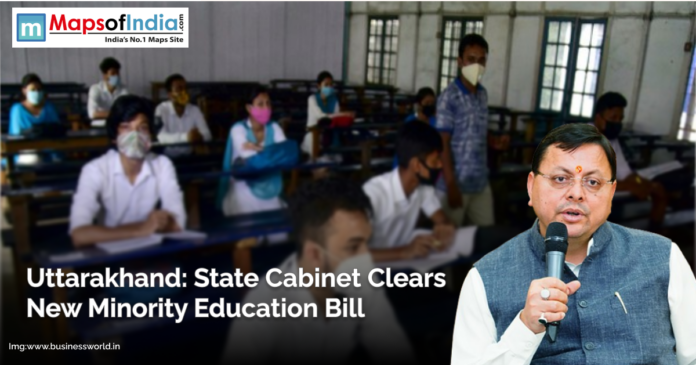With the move, the Uttarakhand government has made a big step towards transforming the structure of minority education in the state. The Uttarakhand Minority Educational Institutions Bill, 2025, has been cleared by the state cabinet and proposes to expand the definition of the minority institutions and a single harmonious system of regulation and recognition.
Such minority status was so far provided to institutions vested by Muslims ethically in state legislation, but not within formal corporative or civil legislative activity. This recognition gave them some rights as far as management, curriculum and protection of cultural identity were concerned. The scope of minority educational institutions will be broadened in the new Bill, where graduates of Sikh, Jain, Christian, Buddhist, and Parsi communities are to be added. This action has been termed as an inclusivity move where several minority groups have been brought under one law.
The repeal of the current Madrasa Education Board Act and the repeal of the rules in it are one of the most imperative functions of the Bill, as it will no longer be in force in July 2026. Instead of this older structure, a new one will be established at the state level and called the Uttarakhand State Minority Education Authority. This entity will screen applications of institutions and recognize them, and ensure that the criteria of education and transparency are upheld in schools and colleges run by minorities.
Minority institutions will have to be registered under some acts under the law since it will require legal registration to be legitimate, like; Societies Act, the Trusts Act, or the Companies Act. They will also be expected to possess assets, a bank account and land in the name of the institution itself. The authority will be able to withdraw recognition in situations where institutions are identified to be mismanaging funds, do not show transparency or are involved in activities that jeopardize societal peace.
The state government has indicated Bill as a proactive step to achieve quality education and equal opportunities for all the identified minority groups. Authorities provide that it will bring about transparency and accountability and will safeguard the rights of the minorities under the constitution to set and run their institutions.
Nevertheless, the ruling has given rise to political and community arguments as well. Those who support the Bill view it as a forward step that will provide a revolution to education and involve society sections who were earlier left out. Sceptics believe that the abolition of the old structure of Madrasa will undermine the traditional systems of learning, and the question of the legality of the rights of minorities under the Constitution would be a matter of concern.
The Bill is due to be presented at the state assembly in the ongoing monsoon sittings, where it will be debated on, revised, allowed and then become legislation.










